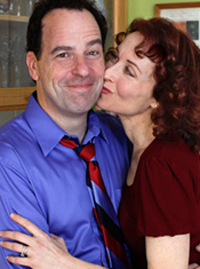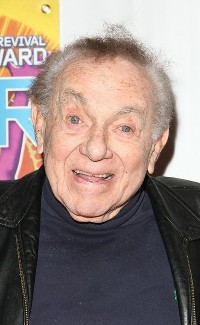‘Holiday Song’: A New Look at Faith with a Compelling and Superb Cast

Loren Lester (George) and Kelly Lester (Naomi)

Jack Carter (Zucker)
PADDY CHAYEFSKY
‘HOLIDAY SONG’
THE CREATIVE ARTS TEMPLE at
WESTWOOD HILLS CONGREGATIONAL CHURCH
SEEN SEPTEMBER 22, 2012
By Carol Jean Delmar
Opera Theater Ink
In the midst of proofreading the memoir and love story I have written about my parents and their struggles during the Holocaust years, I took an evening off to attend a reading of Paddy Chayefsky’s “Holiday Song,” presented by the Creative Arts Temple at the Westwood Hills Congregational Church in West Los Angeles. Since I am a member of the congregation, I had no intentions of writing a review, but I found that I had something to say.
After the reading, Rabbi Jerry Cutler and the play’s director, Stephen Macht, turned the evening into a forum about the word “faith,” and what it really means to each of us.
While watching the presentation of the play, I was pleasantly amazed at the caliber of the actors. Although only a reading with limited rehearsal time, every single actor presented a developed character that was dynamic, real, and had personality, passion, and a love for humanity.
And while they were communicating these character traits, I was forced to listen hard, reflect on the story, and analyze my particular response to it, and to the Cantor. The Cantor (played by Barry Gordon) had lost his faith and was reluctant to continue performing his clerical duties until a miracle befell him. By accident, it seemed, he met a woman on a subway train who had been estranged from her concentration camp-imprisoned mate; and then later, he met a man on another subway train, who matched the description of this woman’s husband. The Cantor was able to reunite these two lost souls, which forced him to reflect on his own faith and wonder how such a miracle could have occurred.
During the discussion after, I wanted to say something, but a sudden burst of shyness came over me. Those speaking were making pertinent comments about faith, but were placing the comments into the here and now. I, on the other hand, couldn’t help but reflect on the past — on my father and on my own upbringing.
As the daughter of Holocaust survivors, I could relate to the Cantor, who questioned his own faith and religion, much like my father did. I was raised knowing that I was culturally Jewish, but I did not have a religious education. My parents told me that my father had worked hard during the weekdays, necessitating him to be on the set of television shows like “The Untouchables,” either early in the morning or until the wee hours of the night. My father had lost his profession due to the Holocaust and had worked his way up to becoming the key costumer on many films and television shows before heading the costume department at CBS Studio Center. Enrolling me in what my parents called “Sunday school” would have been an extra burden, they said, although they showered me with acting, singing, dancing, and piano lessons.
It turns out that I later learned that my father was an atheist. If Adolf Hitler could have done what he did to kind, good, law-abiding people, how could my father believe in God? That was his rationale. My father rarely set foot in a temple. My book details the reasons he no longer had religious faith.
However, after my father’s death, I found that I was looking for “signs” from God to fill the emptiness of losing him. I became a member of the Creative Arts Temple, simply to become part of a community. Maybe the simple act of attending “Holiday Song” was a Mitzvah (or good deed) that the congregation was able to bestow upon me. Having such a community of friends has enabled me to find faith in small and subtle ways, even to have faith that miracles do occur, much as in “Holiday Song.”
So as the audience was analyzing the play and how its message parallels life today, I was reflecting on the two young people who were reunited after the Holocaust, which enabled me to reflect on my own parents, their faith – or lack thereof – and how their beliefs had influenced me.
I am sorry that I never had a religious education, but that has not changed my ability to search for faith in all the right places, so thank you to the Creative Arts Temple for an unexpected thought-provoking evening.
THE CAST:
The bonus of the reading was the wonderful cast of actors who were aptly focused by director Stephen Macht.
Actor-comedian Jack Carter proved that age does not change one’s abilities and talents. As Zucker, he was forceful, energetic and real, all at the same time. Kelly Lester was the perfect Naomi, with her appropriate Jewish traits mixed with warmth, knowledge, and humility. Jesse Macht and Jessica Blair Herman gave sensitive, moving portrayals of the reunited couple. Barry Gordon was an emotionally conflicted Cantor in every sense of the definition. His intense delivery made us unable to decipher when the real Barry Gordon crossed over to become the Cantor in the play. They seemed to be one and the same.
Monica Piper was a standout, taking what seemed to be ordinary words and turning them into gems. Even the supporting subway guard, Howard Krupnick, had his moment onstage and shined. Edith Fields, Loren Lester, Bruce Nozick, and Nolan Porter were excellent. The narrator, Arnold Wise, did his job fittingly.
But the star of the evening was Paddy Chayefsky, who made us all think and then believe.
Rabbi Jerry and Jeff Cutler (co-producer) brought us together for this first Creative Arts Temple play reading. The evening was a resounding success, and I urge everyone to watch for the plays and dates in the upcoming series.